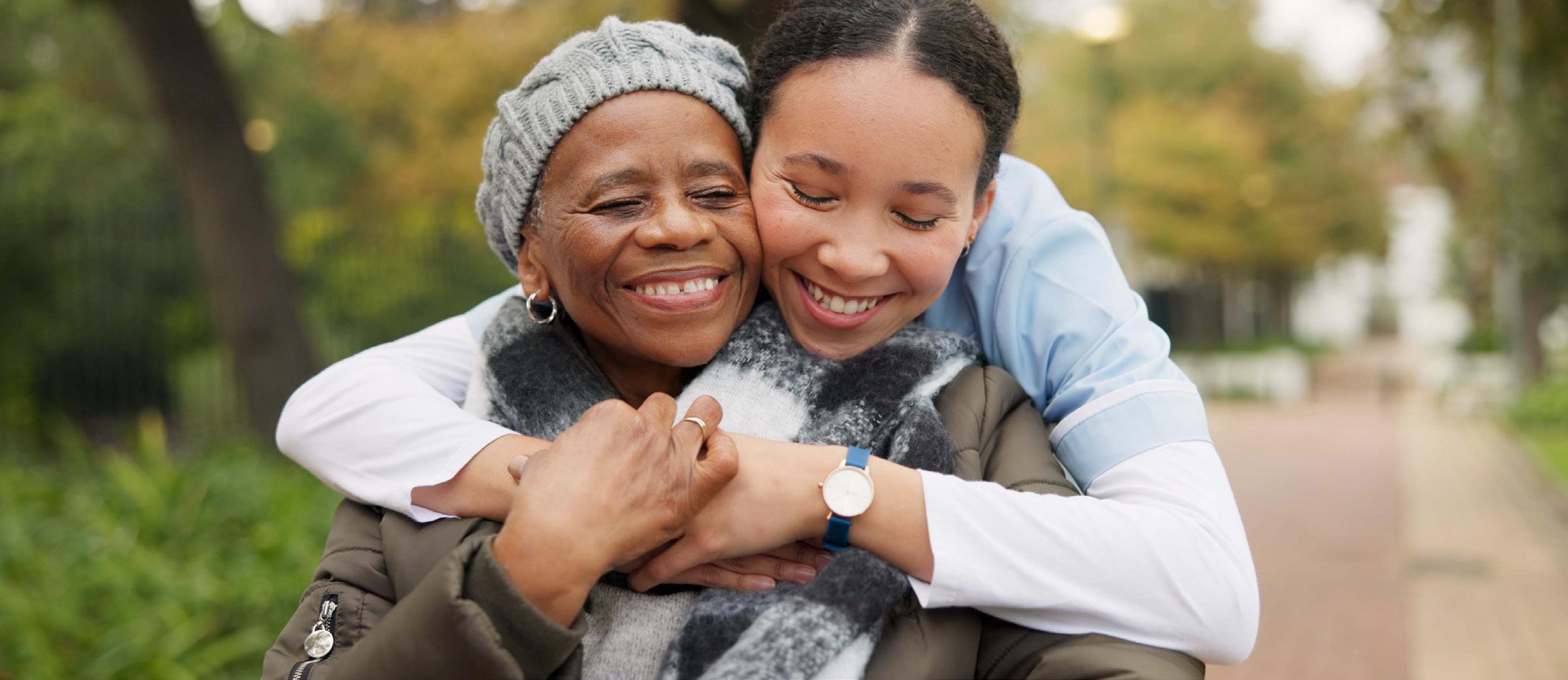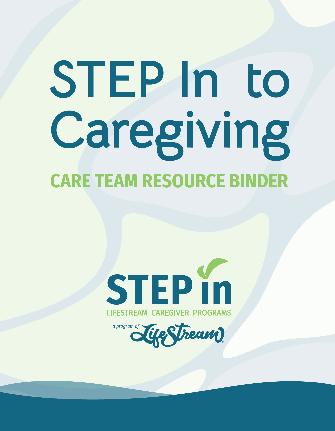




An update from Tia Drumm & Chelsey Krofta, Caregiver Programs Coordinators
As care partners, we all know that caregiving tasks take up the majority of our days—but are you making the time for yourself? It may seem daunting to take time away from your caring duties to focus on yourself, but it is worth it. Family Caregiver Alliance states that 40–70% of family caregivers have clinically significant symptoms of depression, and roughly 4 in 10 care partners find their situation highly stressful. It is imperative that you take time away to focus on yourself, whether that’s looking through old editions of CareLines for mindful tips, taking a walk around the neighborhood, or going out to dinner with your best friend. This is going to help you feel included in a support system instead of isolated at home. It is proven that eight hours away from the caregiving situation each week allows a care partner to decompress and relax. It may be difficult to do this without feeling guilty, but it will be beneficial to you (and your loved one) in the long run.
If your response to stress is physical, such as high blood pressure, headaches, or pacing, you could try physical activities like walking, swimming, a massage, or gardening. If your response to stress is mental, such as excessive worrying or difficulty concentrating, you may try meditation, listening to soothing music,
or reading a book. If your response is a mix of both, you may want to try a stress reliever that targets physical and mental stress, like yoga or tai chi.
Think back to the amount of time you have spent on yourself in the last six months. Would you say that you have spent even eight hours by yourself, away or out of the home of the individual you are caring for? If not, look through some of the suggested activities throughout this newsletter issue and see if there are any that you’d be willing to try!
For Blackford, Delaware, Grant, Henry, Jay, and Madison counties, contact Tia Drumm at (765) 759-1121 ext. 101 or tdrumm@lifestreaminc.org.
For Fayette, Franklin, Rush, Union, and Wayne counties, contact Chelsey Krofta at (765) 759-1121 ext. 281 or ckrofta@lifestreaminc.org.


An
update from Melissa Roseborough, Care Coach
As caregivers, we are entrusted with a profound responsibility—to provide compassionate care that preserves the dignity and respects the individuality of those living with dementia. While this journey presents its challenges, it also offers moments of deep connection and understanding. Here, we explore the importance of dignity and respect in caregiving for individuals with dementia.

Understanding Dignity: Dignity is the inherent value and worth that every person possesses. For someone living with dementia, maintaining dignity can become more complex as the disease progresses. Simple acts such as addressing them by their preferred name, maintaining eye contact, and involving them in decisionmaking processes can significantly uphold their dignity.
Respecting Individuality: Each person with dementia has a unique history, personality, and set of preferences. Respecting their individuality means recognizing and honoring these traits. It involves adapting our caregiving approach to align with their preferences and abilities, fostering a sense of familiarity and comfort.
In our role as caregivers, we hold the power to enrich the lives of those living with dementia by treating them with the utmost dignity and respect. Caregiving requires resilience, empathy, and a commitment to seeing beyond the disease to the person within. Every interaction is an opportunity to foster connection and preserve their sense of self-worth. By embracing their individuality and adapting our approach accordingly, we can create a nurturing environment where they feel valued and understood. Together, let us continue to advocate for compassionate care that upholds the inherent dignity of every person, regardless of their cognitive abilities.
Kelly Smith stepped into her role as LifeStream’s Dementia Outreach Specialist in April and is covering area 9 (Fayette, Franklin, Rush, Union, and Wayne counties). Kelly holds a degree in Human Services from Purdue University and has worked in Human Services fields for the last 15 years. Since joining LifeStream in April, Kelly has obtained her Certified Dementia Practitioner credentials (CDP) from the National Council of Certified Dementia Practitioners and has worked on implementing Dementia Live partnerships in our communities.
Kelly will continue to work with community partners and Health Networks to provide evidence-based trainings and development, community education, and partnerships to help improve the quality of life, care, and services for persons living with dementia. If you are interested in becoming a Dementia Friend or experiencing Dementia Live, please reach out to Kelly at (765) 759-1121 ext. 291 or kjsmith@lifestreaminc.org.

Visit lifestreaminc.org/stepin for Memory Kits and Dementia Caregiver Support Groups


An update from Tia Drumm, Caregiver Programs Coordinator
Balancing self-care with caregiving responsibilities helps prevent burnout, reduce stress, and sustain your physical and emotional health. By dedicating moments to recharge, you enhance your overall effectiveness in caregiving, ensuring that you can continue to offer compassionate and attentive care. Below are a few exmples of things you should not feel guilty about doing for yourself:
• Taking time for yourself
• Letting your friends or family know how you are feeling
• Doing something on your own
• Telling someone “I can’t help you with that, but I could help you find someone who can”
• Searching out resources or education to help you on your journey
• Attending a support group
• Taking a nap or resting throughout the day
• Taking part in a class that interests you
If you are looking for more support or wanting a group to relate to, check out the upcoming events below to learn more about programs and events in your area, or visit lifestreaminc.org/stepin
New Monthly Caregiver Gathering in Muncie!
A caregiver gathering is a time for caregivers and care partners to come together and take a break, enjoy food, share resources, and support one another.
• Second Thursday of the month, 1:30–3pm
• The Woodlands
3820 W. Jackson St., Muncie, IN
New Monthly Memory Café in Muncie!
Memory Cafés are a welcoming, safe space for people living with dementia and their caregivers to enjoy social engagement and a break from their normal routine.
• Last Friday of the month, 1:30–3pm
• The Woodlands
3820 W. Jackson St., Muncie, IN
Visit lifestreaminc.org/calendar for a complete list of events


An update from Rachel Gray, Care Coach
Caring for someone with Alzheimer’s or dementia can be emotionally and physically demanding. Seeking professional support, understanding personal motivations, and practicing self-care are essential for caregivers to manage their own well-being while providing compassionate care.
Seeking Professional Help: It’s important for caregivers to seek support from mental health professionals and social workers to manage stress and emotions. These professionals can also assist in making plans for unexpected situations.
Tips for Self-Care: Caregivers should prioritize self-care—and it’s not selfish. Reflecting on your motivations for caregiving—whether out of love, duty, financial concerns, or other reasons—can provide clarity.
Finding Uplifts: Allowing yourself to experience day-to-day positives, such as moments of joy with the person being cared for, support from others, or personal interests, can help maintain emotional well-being.
Effectiveness in Caregiving: When you are well-cared for, you can offer consistent and reliable support to your loved one. Your ability to be patient, compassionate, and resilient is enhanced when your own needs are met.
Avoiding Burnout: Caregiving can be demanding. Neglecting your own needs can lead to burnout, resentment, and reduced effectiveness in providing care. Regular self-care helps prevent these negative outcomes.
By prioritizing your own well-being and practicing self-care, you are better equipped to provide the best possible care to others, including those you care for as a caregiver. It’s an essential component of maintaining both your own health and the quality of care you provide.





Celebrating caregiving milestones is an important way to recognize the dedication, resilience, and achievements of caregivers or our own caregiving journey. Below are some meaningful ways to celebrate these milestones:
1. Reflect, Acknowledge, and Set New Goals: Take the time to reflect on your caregiving journey and truly acknowledge all the milestones, big or small. This could include a specific caregiving anniversary, overcoming a challenge, or reaching a goal you have within your caregiver tasks. Use your milestones as a way to set new goals that reflect growth and continued commitment.
2. Share with Others: Share your stories, memories, and achievements with loved ones, friends or peers as a support group who understand and appreciate the caregiving journey. Consider attending a Monthly Caregiver Gathering to share with other caregivers.
3. Write it Down: Create a memory book, journal, scrapbook, or even write yourself a letter. Compile photos, notes that capture important moments and milestones throughout. Include encouragement and passion that you can re-read to yourself when needed.

4. Plan to Celebrate: Treat yourself or coordinate a small in-person or virtual celebration with friends or family. Use this time to express appreciation for yourself and for others’ support. Enjoy a hobby or new activity, such as a spa day, a movie, or a meal at your favorite restaurant.
5. Practice Self-Care: Dedicate time to self-care activities that rejuvenate and replenish your energy, such as meditation or a hobby you enjoy.
Celebrating personal caregiving milestones is not only a way to honor your dedication but also to foster a sense of accomplishment, resilience, and well-being for others.
For more information about caregiver support programs, events, and other resources, visit lifestreaminc.org/stepin.



My name is Rachel, and I am a Care Coach at LifeStream. I grew up in Richmond, then went on to receive a degree in Human Services from Ohio Christian University. My love and personal experience working with people living with dementia propelled me into working alongside individuals with dementia providing direct-patient care in long-term care and assisted living facilities. I am also currently providing respite care for my mother while she cares for my grandmother with dementia, and aid in helping my father provide care to my paternal grandmother who is living with dementia. I am so excited to put my experience to work in a different way for you and your loved one(s)! I love direct-patient care, but I felt I had bigger calling ahead of me, and I’ve found that calling in the Care Coach program. I have achieved a CARES Dementia Specialist certification, and I have also acquired a certification through the National Council of Certified Dementia Practitioners.
In this program, we meet in the home or speak by telephone once a month for three months. After the initial three months, we move to a visit once every three months. My goal is to be an advocate for you, reduce your stress, and help with your quality of life as a caregiver. I look forward to the opportunity to become a support for you. If you are interested in the program, please reach out to me at (765) 759-1121 ext. 283 or rgray@lifestreaminc.org.
1701 Pilgrim Blvd.
Yorktown, IN 47396
lifestreaminc.org
(800) 589-1121 | lifestreaminc.org | facebook.com/lifestreamservices
LifeStream’s STEP In Caregiver Programs are a comprehensive way to educate and support family caregivers, care partners, and people with care needs. LifeStream offers Caregiver Memory Kits, support groups, and evidence-based programs to help you STEP In to caregiving. LifeStream Services is also thrilled to provide caregivers and care partners with a resource binder that is an organizational tool used to prepare in the case that someone else may need to step in and provide care— either temporarily or permanently—and to empower caregivers who help with care needs.
Individuals who may need to step in could include another family member, a professional caregiver, a neighbor, or a friend. All of these care partners make up your care team.
Request a Care Team Resource Binder here: lifestreaminc.org/form-stepin-binder-request
